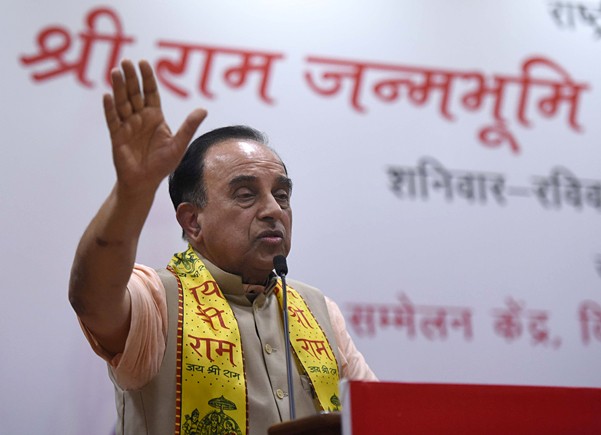Subramanian Swamy has again come to the rescue of the Ram Mandir movement in Ayodhya. This time around he has moved to the Supreme Court seeking urgent hearing of his plea for enforcement of the right to worship at the birthplace of Lord Ram. Earlier, the Supreme Court had rejected thirty-two intervening petitions including those by filmmaker Shyam Benegal and actress Arpana Sen who argued that the land be put to ‘secular use’ rather than religious uses. A special Supreme Court bench had then made it clear that only the original parties to the land title dispute will be allowed to advance arguments. However, Subramanian Swamy got a major shot in the arm in that hearing. The court had ordered revival of an earlier writ petition in which Subramanian Swamy had claimed the right to worship at the Ram temple on the disputed site in Ayodhya.
Subramanian Swamy has time and again put up a determined fight against the anti-Hindu cabal and it is not a matter of surprise that he has yet again launched an assault against them. In fact, it was Subramanian Swamy himself who had protected the Ram sethu from being dislodged by the Congress-DMK duo. The UPA government had in 2005 taken up the Setu Samudram Canal Project (SSCP) with the intention of demolishing the Ram sethu ignoring the sentiments of millions of Hindus as the ancient bridge is an important part of Hindu history. However, Subramanian Swamy emerged victorious as he sought a stay on the ill conceived plan and the same was granted by Justice Agarwal. In the process, the Congress was prevented from going ahead with its sinister conspiracy and a major travesty of justice was prevented.
As stated earlier, while several intervention petitions had been dismissed by the Supreme Court in the Ram janambhoomi case, the Supreme Court had allowed revival of an earlier writ petition filed by Subramanian Swamy seeking enforcement of fundamental right to worship at the disputed site in Ayodhya. It is to be noted that this writ petition stands independent of the ongoing land dispute case. It is not an intervention but an extraordinary relief seeking the enforcement of the fundamental right to pray. As correctly stated by Subramanian Swamy, the right to pray is superior to the property rights contested in the title dispute. While the right to claim title is merely a civil right that entails a cumbersome civil procedure, the right to pray is a fundamental right that stands at the apex of different kinds of rights and there is an efficacious remedy under Article 32 of the Constitution of India to approach the Supreme Court of India in case there is a violation of the right. The right to worship emanates directly from Article 25 of the Constitution of India that confers on every citizen the right to freely practice, profess and propagate religion. The apex court had accepted this argument stating that the writ petition filed by him shall spring back into action and be dealt with accordingly before an appropriate bench.
The delayed verdict in the Ayodhya case has done great harm to the religious sentiments of the Hindus living in India. Lord Ram is central to the core belief of Hinduism and it is hurtful for the Hindus that they are restrained from building a temple at his birthplace. However, the apex court has finally decided to expedite progress on this case especially by preventing unnecessary parties from intervening in the matter at a time when Hindus have been feeling help-less in the face of continuing denial of rightful title in the dispute. However, with this writ petition a new ray of hope has emerged for the Hindus and since this petition is based on sound footing it seems that a substantive relief is on the way for Hindus. The right to pray can be enforced in a timely manner as opposed to the resolution of a land dispute. If Swamy manages to convince the court regarding his petition it would mean that even though the land dispute is not resolved, the Hindus will be able to at least exercise their fundamental right to worship at the disputed site.
